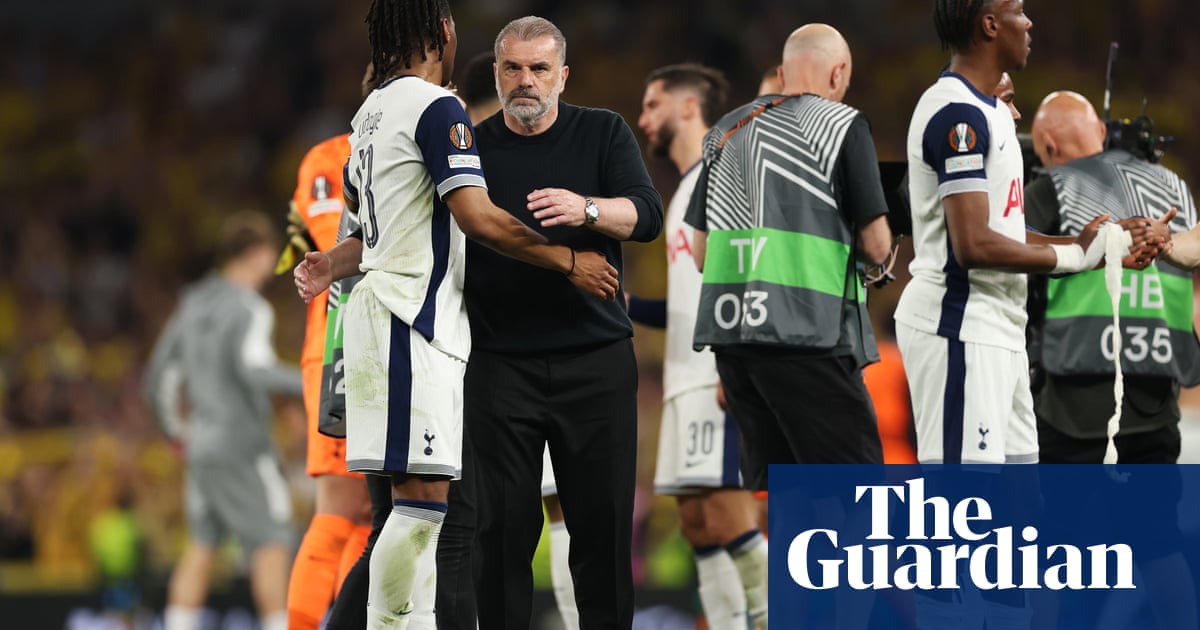Ange Postecoglou says the only cure for the anxiety at Tottenham is for the team to end their 17-year wait for silverware. The manager felt the mood inside the club’s stadium shift sharply on Thursday night when they conceded for 3-1 towards the end of the Europa Leaguesemi-final first leg against Bodø/Glimt.
Before that the atmosphere had been excellent, the players responding, but it seemingly does not take much for the fans to begin to fear the worst. The tie finished 3-1, which should be enough for Spurs to navigate Thursday’s return after Sunday’s Premier League trip to West Ham. Yet there has been nervous talk about Bodø’s impressive home record, the perils of their artificial surface and the cold that awaits in the Arctic Circle.
Postecoglou noted that he had also felt a “real nervousness in the stadium” when Spursconceded at home against AZin the last 16 and Eintracht Frankfurt in the quarter-final. The concession against AZ was in the second leg for 2-1 on the night and 2-2 on aggregate. Against Frankfurt, it was the first leg and an early goal that gave the German club a 1-0 lead.
“People are their experiences and Tottenham supporters have had some real near misses for a long time,” Postecoglou said. “So there’s always this safeguard of not getting too excited about what’s happening, but part of creating a winning culture is not to fall into that trap. Winners don’t think about things in that way; they don’t think about what could possibly go wrong.
“I’ve said before that the narrative around the club is not positive at all. That’s existed for a very long time and you need to break through that. I’m trying to create a culture within the group at least that that can’t guide our destiny because that’s almost self-fulfilling. If you expect something to go wrong, it will.
“I don’t know if it’s a culture in the club; it’s a culture around the club. Obviously if you accept that then you are almost self-prophesying what’s going to happen. I don’t accept that. But with all of these things, there’s really only one remedy: win. That’s what we’re trying to do.”
Postecoglou was asked whether he could control what went on outside the squad. “No, I can’t control it,” he said. “It’s fair to say I’ve tried but it’s a losing battle because there’s a lot of stuff that feeds into that and people invariably react to it. If you’re feeling insecure about something and you’ve got 20 people telling you that you should be insecure, you’re going to be insecure. So I can’t change that.
“You’ve got to stay very focused on what you can control and we can’t control how people feel, we can’t control the anxiety of … whether it’s our supporters or whatever narrative is around us. What we can control is our behaviours and our performance.”
Sign up toFootball Daily
Kick off your evenings with the Guardian's take on the world of football
after newsletter promotion
Postecoglou said Lucas Bergvall was out for the rest of the season with the ankle ligament injury sustained in training before the Bodø/Glimt game. “He went to turn and his ankle gave way,” the manager said. Dominic Solanke and James Maddison were forced off during Thursday’s game and if the former was nothing “too serious” – in the words of Postecoglou – the latter was “more of a concern because it’s the knee”.
